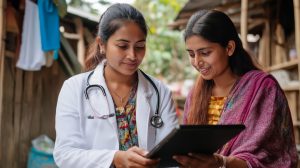After graduating from college, I lived on an isolated farm in the heart of South India, separated from my support systems by ten time zones and thousands of miles. I was working at a residential home for people with intellectual disabilities before beginning medical school, and hoped to learn how community-based medicine and psychiatric care can approach disabilities globally.
Once I arrived at the residential farm, however, I spent most of my time learning to hand wash my clothes, tell chicken feed apart from cow manure, and nod along even when I couldn’t parse through the rapid-fire Tamil everyone spoke. On my third day, I woke up with a stuffy nose, and for the next week, I spent sleepless nights flipping from side-to-side and using Flonase. When the villagers saw me, they made fun of my neon green nasal spray and encouraged me to try herbal leaves and teas. After all, they didn’t trust Western medicine, doctors, or practices. They managed epilepsy with a Keto diet and behavioral issues with twice-daily community yoga sessions.
My nose was particularly clogged one day, and I was sleep-deprived. I was talking to Kavi, a student who led morning yoga, and as he began telling me about the healing powers of hibiscus tea, I interrupted impatiently, “Flonase works. Scientists have extensively studied inflammation, and the chemical corticosteroids in the medicine can inhibit this pathway. It’s not just Flonase. In America, we have antiepileptics and mood stabilizers and antipsychotics, all of which could help the students here…”
When I finished, Kavi smiled and simply said, “Thank you.” I looked around the yoga circle, which was filled with nervous laughter, silent nods, and lowered eyes. My face felt hot as I realized I had gone on a five-minute tirade riddled with medical jargon in rapid-fire English.
Later, this exchange reminded me of Raymond Carver’s poem, “What the Doctor Said,” in which a patient, given bad news, does not understand everything the doctor says but still shakes his hand and even thanks him—“habit being so strong.”
Of course, the only thing Kavi could say was a friendly thank you, even if he was confused, distrustful, or disagreed with me. After yoga, I apologized and asked him to tell me about the tea.

He spoke slowly because he knew my ears had not adjusted to the village slang. His parents married at 11 and had him at 15. Due to a birth complication, Kavi was born with cerebral palsy. His childhood was filled with abuse and family strife as he tried to control his seizures. He described negative experiences with doctors, many of whom assumed disability was synonymous with mental retardation. I realized his skepticism was not necessarily distrust, but a reasonable mistrust—many other students at the residential home had been overmedicalized and overtreated with drugs that had significant side effects.
Kavi asked about my life in the United States and never interrupted me. I told him how it took a day to get to India. He asked if it was by train or bus. I explained the plane ride. To him, Madras and Massachusetts were neighbors. Parts of Kavi’s world were unknown to me, and parts of mine were unknowable to him. Still, he approached everything I said with curiosity. In Kavi, I found an unexpected mentor, and through our conversations, I began to love a community mistrustful of the type of medicine I hoped to practice.
Most medical professionals interrupt patients within 11 seconds of them talking. When we move quickly—whether by choice, necessity, or habit—patients are forced to do the same. It may feel impractical to take time to understand someone so different from us, but it is necessary. Kavi taught me that these discussions are about inviting—not convincing—one another to adopt new ideas.
I embraced a model of professionalism that prioritizes listening, respect for alternative medicines, and shared decision-making over expert biomedical solutions. Learning about the solace he found through natural remedies and yoga inspired much of my work in medical school. I now conduct clinical research that builds data-driven arguments for yoga-based interventions to complement existing psychiatric treatments.
Ultimately, I vow to learn from Kavi and from Carver’s poem. I vow to never make a patient feel ashamed to ask for clarification, as if it were a third serving of dessert. I vow to slow down, even if time constraints prevent me from giving necessary thank you’s and endow upon me undeserved ones. I vow to learn from patients’ questions, ideas or, even, mistrust.
Akila Muthukumar is a first-year medical student at Harvard Medical School. She studied developmental biology and English in college and hopes to continue writing throughout her career. She also enjoys bagel shops, board games, and all things theater!

